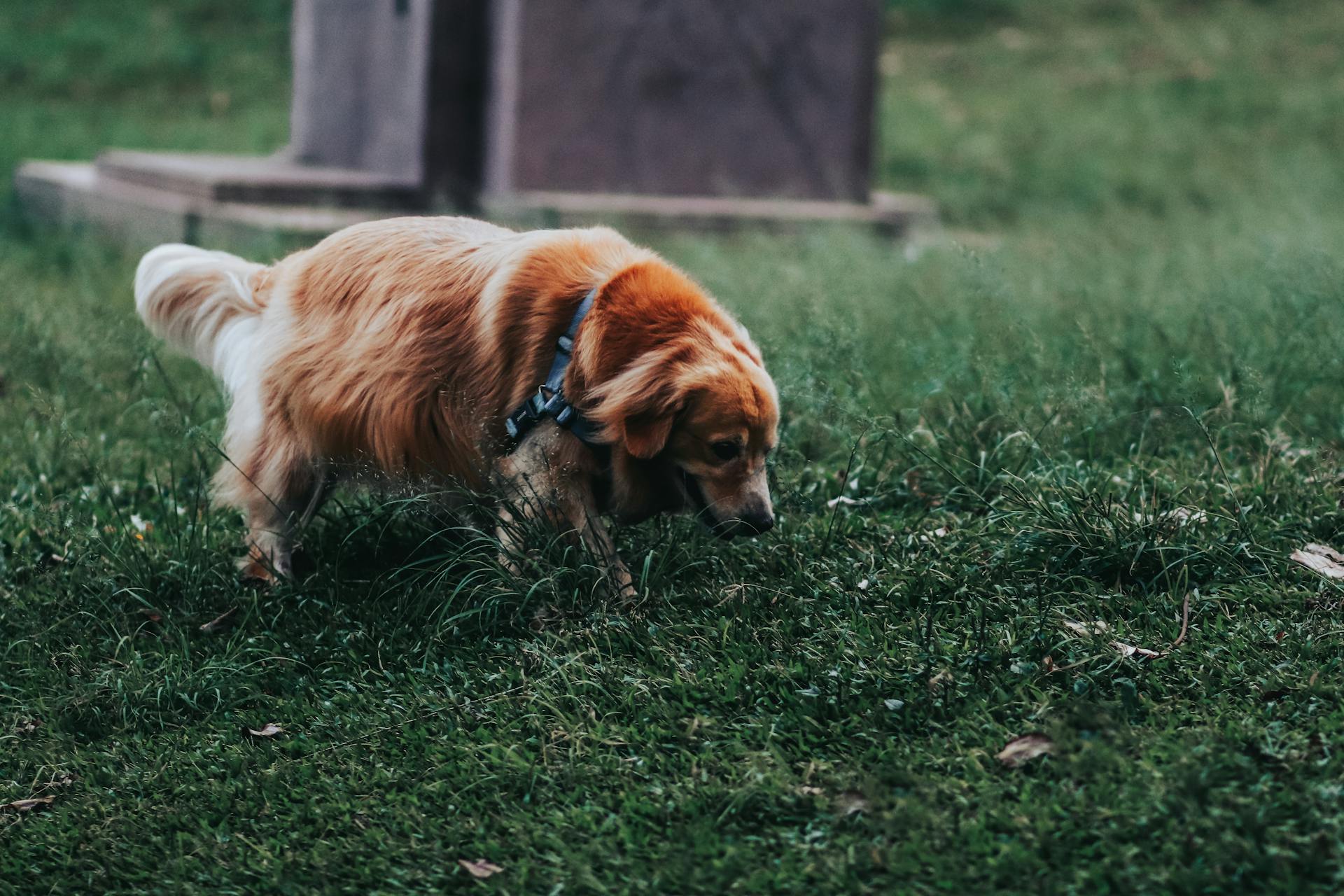
Certified Behavior Consultant Canine certifications are a way to ensure that a dog trainer or behaviorist has the necessary knowledge and skills to help you and your furry friend.
These certifications are typically offered by professional organizations, such as the International Association of Animal Behavior Consultants (IAABC) or the Certification Council for Professional Dog Trainers (CCPDT).
The certification process usually involves passing an exam that tests the candidate's knowledge of canine behavior, learning theory, and training methods.
The Certified Behavior Consultant (CBC) certification is a highly respected credential in the industry, recognized for its rigorous standards and thorough examination process.
Explore further: Do Service Dogs Need Identification
Three Certification Options
So you're interested in becoming a certified behavior consultant canine? Well, there are three main certification paths you can take, and I'll break them down for you.
You can get certified through an independent certification organization that assesses your prior dog training knowledge and experience. This is a great option if you've already been training dogs for a while.
Or, you can pursue a qualification from a government-recognized educational establishment, such as a college or university. However, this option might be harder to come by in some parts of the world.
Alternatively, you can enroll in a course or certificate program offered by a private business. Just be sure to do your research and choose a reputable program.
Here are some of the organizations that offer certification:
- IAABC (International Association of Animal Behavior Consultants)
- AABP (Association of Animal Behavior Professionals)
- IACP (International Association of Canine Professionals)
- NADOI (National Association of Dog Obedience Instructors)
- PPAB (Pet Professional Accreditation Board)
Some of these organizations offer specialized certifications, such as the ABT (Animal Behaviour Technician) or CAB (Clinical Animal Behaviourist) certifications offered by the PPAB.
The NADOI, for example, has multiple membership levels and specialty certification options, so be sure to check them out if you're interested in their programs.
I hope this helps you get started on your path to becoming a certified behavior consultant canine!
Certification Process
To become a certified behavior consultant canine, you'll need to go through a certification process that assesses your knowledge and skills. The Certification Council for Professional Dog Trainers (CCPDT) offers three certifications: CPDT-KA, CPDT-KSA, and CBCC-KA.
Readers also liked: Healthy Mind Canine - Separation Anxiety Training
The CPDT-KA certification requires candidates to have at least 300 hours of experience in the last three years, confirm their compliance with LIMA, and pass a 200-question exam.
Candidates must demonstrate a broad range of knowledge and skills in ethology, learning theory, dog training technique, and instruction. The exam is a reliable indicator that someone is committed to ongoing education and positive reinforcement techniques.
To achieve the CPDT-KSA certification, individuals must submit video recordings of training sessions, which are evaluated by the CCPDT. This additional step requires trainers to demonstrate their skills in real-life scenarios.
The CBCC-KA certification requires candidates to pass a standardized test that covers applied behavior analysis, consulting skills, and best practices. This certification covers a wide range of topics, including ethology, body language, observational skills, health, development, life stages, anatomy, and physiology.
The CBATI-KA program provides trainers with a solid foundation in the theory and spirit behind the BAT method. It's the first step on the journey to becoming a Certified Behavior Adjustment Training Instructor – Knowledge and Skills Assessed (CBATI-KSA).
Choosing a Certification
Certified behavior consultant canine certifications can be obtained through various paths, including certification organizations, government-recognized educational establishments, and private businesses.
You can choose from a few different options for certification, such as an independent certification organization, a government-recognized educational establishment, or a private business offering a course or certificate.
The International Association of Animal Behavior Consultants (IAABC) and the Association of Animal Behavior Professionals (AABP) are two organizations that offer certification options.
Some certifications, like the Certified Behavior Consultant Canine (CBCC-KA) certification, require passing a standardized test covering applied behavior analysis, consulting skills, and best practices.
The Certification Council for Professional Dog Trainers (CCPDT) offers several certifications, including the CPDT-KA, CPDT-KSA, and CBCC-KA.
To ensure you're getting a reputable certification, look for certifications that require instructors to be named and have a bio available.
Certifications can also be obtained through vocational qualifications or course/certificate programs from private businesses.
In addition to certifications, some colleges and universities offer courses and qualifications in animal behavior and training, such as the New Zealand Certificate in Animal Management (Canine Behaviour and Training) or the Certificate IV in Companion Animal Services.
Here is a list of some certifications and qualifications:
- CBCC-KA (Certified Behavior Consultant Canine-Knowledge Assessed)
- CPDT-KA (Certified Professional Dog Trainer-Knowledge Assessed)
- CPDT-KSA (Certified Professional Dog Trainer—Knowledge and Skills Assessed)
- New Zealand Certificate in Animal Management (Canine Behaviour and Training)
- Certificate IV in Companion Animal Services
- Working with Canine Behaviour – Analysis & Application (Level V Open College Network qualification)
Certification Types
There are several types of certifications available for dog trainers, and understanding these options can help you decide which path to take.
Certification options for dog trainers include assessment of prior knowledge and experience, qualification from a government-recognized educational establishment, and course/certificate from a private business.
Some organizations offer specialized certification options for trainers who want to work with specific issues, such as reactivity, fear, or aggression.
The International Association of Animal Behavior Consultants (IAABC), Association of Animal Behavior Professionals (AABP), International Association of Canine Professionals (IACP), and National Association of Dog Obedience Instructors (NADOI) are all reputable organizations that offer certification options.
The IAABC offers certification options through the PPAB, which includes the ABT (Animal Behaviour Technician) and CAB (Clinical Animal Behaviourist) designations.
Specialized certifications like the Certified BAT Instructor, Fear Free Animal Trainer Certification Program, Separation Anxiety Training Certificate Program, and Aggression in Dogs Master Course are available for trainers who want to specialize in specific areas.
Discover more: Can Dogs Smell Fear
The Certification Council for Professional Dog Trainers (CCPDT) issues certifications such as the CPDT-KA, CPDT-KSA, and CBCC-KA, which demonstrate a trainer's commitment to ongoing education and positive reinforcement techniques.
Here are some certifications offered by the CCPDT:
The CBATI-KA and CBATI-KSA certifications are also available for trainers who want to specialize in the BAT method.
Training and Education
If you're interested in becoming a certified behavior consultant canine, you'll want to know about the various training and education options available. You can take a course via a college or registered education provider, which will give you a recognized qualification. However, most of these courses aren't available via remote learning, so you'll need to attend workshops and practical sessions to qualify.
The UNITEC New Zealand | New Zealand Certificate in Animal Management (Canine Behaviour and Training) is just one example of a course that meets the minimum educational standards required for canine behavior and training. Other options include the DELTA Institute Australia | Certificate IV in Companion Animal Services and the NDTF – National Dog Training Federation (Australia) | Certificate III in Dog Behaviour and Training.
Alternatively, if you're already an experienced trainer, you can go through an independent certification provider like the Certification Council for Professional Dog Trainers (CCPDT). They offer various certifications, including the CPDT-KA (Certified Professional Dog Trainer – Knowledge Assessed) and the CBCC-KA (Certified Behavior Consultant Canine – Knowledge Assessed).
Explore further: Higher Education Dog Training
Assessment of Prior Knowledge & Experience
If you're an experienced trainer with extensive theoretical knowledge and practical experience, you can opt for an independent certification provider. This is often the simplest and cheapest option.
The Certification Council for Professional Dog Trainers (CCPDT) offers several certifications, including CPDT-KA, CPDT-KSA, and CBCC-KA. These certifications require an exam, evidence of training hours, and a portfolio of case studies or client histories.
You'll also need to provide a video demonstration of your training skills for some programs. This is a great way to showcase your expertise and build confidence in your abilities.
Here are some certifications offered by CCPDT:
- CPDT-KA (Certified Professional Dog Trainer – Knowledge Assessed)
- CPDT-KSA (Certified Professional Dog Trainer – Knowledge and Skills Assessed)
- CBCC-KA (Certified Behavior Consultant Canine – Knowledge Assessed)
Many trainers choose to hold certifications from organizations like CCPDT, IAABC, AABP, and IACP. These certifications can help you stand out in the industry and increase your earning potential.
In fact, a survey of dog trainers found that the majority of trainers held some sort of certification, with CPDT being the most common. This suggests that certifications are highly valued in the industry.
Qualifications Training Courses
If you're looking for a recognized qualification in dog training, colleges and registered education providers offer courses that meet minimum educational standards. These courses often require attendance at workshops and practical sessions, but some, like the IMDT course, are delivered online.
Some examples of courses that lead to recognized qualifications include the New Zealand Certificate in Animal Management (Canine Behaviour and Training) from UNITEC New Zealand and the Certificate IV in Companion Animal Services from DELTA Institute Australia.
If you can't find a vocational course near you, a University degree in Animal Behaviour can provide a thorough theoretical foundation. Many universities worldwide now offer these degrees, making location less of an issue.
However, University degrees in Animal Behaviour may not be species-specific and may not provide the practical skills you need for dog training. But if you enjoy learning, they're a great option.
Here are some examples of courses and qualifications:
Frequently Asked Questions
What is the difference between a dog trainer and a behaviorist?
Dog trainers teach specific skills and commands, while behaviorists address underlying causes of problematic behaviors, such as anxiety and aggression, using scientific principles and evidence-based techniques
What is the highest rated dog training certification?
The Certified Professional Dog Trainer (CPDT) certification is widely regarded as the highest rated dog training certification, demonstrating mastery of humane and science-based training practices. Maintaining a CPDT certification is a mark of professional excellence in the dog training industry.
What is the highest level of dog training certification?
The highest level of dog training certification is the Boarded Behaviorist, which requires advanced degrees and extensive knowledge of behavioral health. This elite certification is reserved for professionals with a deep understanding of canine behavior and psychology.
Sources
- https://michigandogtraining.com/about/michael-burkey/
- https://avsab.org/behavior-consultant/category/dog-behavior-consultants/united-states/california/
- https://e-trainingfordogs.com/cbcc-ka-exam-study-courses/
- https://dogtrainersumbrella.com/blog/certification-options-for-dog-trainers-whats-available/
- https://baypathhumane.org/what-does-that-dog-training-certification-mean/
Featured Images: pexels.com


